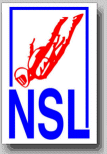
National
Skydiving
League
226 Pecan Street
Deland FL 32724
tel: (386) 801-0804
© 2003 - 2024
All Rights Reserved


226 Pecan Street
Deland FL 32724
tel: (386) 801-0804
© 2003 - 2024
All Rights Reserved

Up Close & Personal
name: Jerome David
email: vr4france@hotmail.com
age: 57
education: - BAC Scientifique
- BA: Law
- Sports Professor
- Mental Coach
number of jumps: 9,000
years in Sport: 39
teams: RCA 1986-1989, France Essonne 1990-1995, France Perris Maubeuge 1996-2001
slot(s): Tail
favorite competition: World Championships Lucenec 1991
funniest moment in skydiving: Too many to pick one.
skydiving mentor(s): Philippe Schorno was my team leader from 1990 until 1993, he was also my piece partner. He is the one who allowed me to achieve my dreams. I like his fairness and tenacity. Now, he is my colleague at the French Federation, we’re working together, hand i
hobbies: Daughter Lou
favorite book(s): I never read.
favorite music: French songs.
favorite movie(s): All movies by Claude Lelouch.
favorite place: Walking in the mountains, diving in the blue waters, surfing the light snow or home.
Where will you be ten years from now? I will still be watching the eternal battle for Excalibur, and admire performances being higher and higher.
best kept secret: No secrets.
favorite quote:
"Second place is the first loser."


Jerome David was 18 years old when he made his first jump on a July day of 1984 in Luc, a town in the southern countryside of France. It was a jump that would soon change his whole life. And it happened by coincidence when a friend from school told him during one of their classes that he would go skydiving. From here on, they never ever talked about anything else in class.
While living in Nice, where he was studying the law and was jumping on the weekends at Luc's skydiving centre, David advanced very rapidly through the skydiving classes. When he was done with his static line jumps, he fell in love with freefall, which was a true revelation for him. His life changed completely when he came to understand that this was the life he had been longing for. He felt that his life would now take place at a skydiving centre and that he was headed to become a freefall world champion one day.


Right after he got all his skydiving licences, David built his first 4-way team together with his best friend, Francis David. The team name was RCA (Relatif Cote d’Azur). To finance the team, they founded a skydiving club and looked for sponsors. Little by little, this adventure took shape. The team began training every other weekend. The rest of the week, David continued to study in school and worked to make money for the training. In 1986, he attended his first French national championship and had a wonderful experience. His team won the junior event. But even more important was his experience of exploring the exciting world of skydiving competition.



When David first grabbed the grips of his partners in the turquoise skies of Castellon in January 1990, a dream became true for him. After a few jumps, he overshoots the average of the RCA by 10 points, with scores reaching 21 points in freefall. After 400 jumps, the new team PUC-TAG achieves the same score as that of the World Championship in 1989. The machine is on its way, the confidence of the young members like Patrick Saget and Jerome David easily blends in with the expertise of the veterans Eric Fradet and Philippe Schorno.



During the preparation for the 1993 World Championship, David alternated training with studies to become a sports professor. To continue and achieve all of his dreams, David knew that it was necessary to prepare for the future. Skydiving was still not a sport that offered a social status. In 1992, France won the next World Cup on home turf in Gap 16 points ahead of DeLand Vertical Speed with Jack Jefferies. It was an era of absolute dominance for France-Essonne who again beat the world record with 26 points

The French team invented the vertical techniques and "cheated" the shape of formations. Between 1990 and 1993, they increased the scoring average from 15.0 to 19.5 points. Their goal was not only to defend their title at the World Championship in 1993 in Eloy. David's team also wanted to be the first team in history to cross the mythical bar of the 20-point average.


Early in 1994, the Federation Francaise De Parachutisme (FFP) promoted Jerome David as the national coach, and David took the helm now leading the French 4-way team. With his good friend Eric Fradet, he called in two new young partners, Claude Tzifkansky and Paul Grisoni. The team resumed their activities at a very low level (13-point average), while in the United States the newly formed Arizona Airspeed, a joint venture of veteran competitors from DeLand Vertical Speed (Jack Jefferies, Kirk Verner) and Air Moves (Dan BC, Mark Kirkby) planned the new attack on the French dominance. It was very serious since Airspeed would begin at a 19-point average level. David remembered his conversation with Dan BC in 1991. BC’s destiny would now get closer to David's.

It was a poor consolation that for the first time in history, two rival teams had crossed together the magic 20-point average benchmark. France-Essonne scored a 20.5 meet average, Airspeed finished with 20.7 points. The French drama got even worse when the French 8-way team of Didier Boignon also lost to the Golden Knights at the same world meet in France.

Disappointed with these results, David was also unhappy with the general climate that characterized the spirit of the two French teams during these two years of preparation. David's spirit of love, respect and family atmosphere between the French national teams was simply absent. The groups were aging and did not work well any longer. Since David was competitor, technical leader and national coach at the same time, he saw how difficult it would be to undertake vast reforms while continuing to jump with the 4-way team.

David saw the same glimmer in Maubeuge's team members' eyes (Martial Ferre, Thierry Boitieux, Marin Ferre and Davide Moy) that had been in his own eyes when he lived in the trailers of his first training place in Avignon-Pujaut. David believes that the quest for Excalibur has always been a tribal adventure. It is a gift of oneself to the teammates with many sacrifices. The new journey would be a long one for the Maubeuge members since they averaged only 15.5 points at that time.

This was a surprising comeback in the big arena and David was still right on top of the team performance. France-Maubeuge almost made it when the scores were still equal after eight rounds. However, in rounds nine and ten, Airspeed played a big game and became irresistible. Maubeuge was extremely disappointed, and David had to think of further innovations to motivate the team again until 1999. He now set up a custom made strategic project for Maubeuge. He also negotiated a very promising partnership with Skydive Perris in California, for he felt that it was a place that radiated positive energy.

During the next two years, France Perris-Maubeuge trained with ambition. But the team still had to deal with David Moy’s shoulder injury. During the 1998 World Cup in Portugal, David had to replace Moy again, and the team had to bow down after a tie-breaking jump facing the U.S. team FX. However, this phase of the team progression allowed Jerome to define two new strategic axes that would prove important for the future. One was “smoothing??? the blocks to raise speed. All the techniques of the group were modified and the tenths of seconds fell block after block. Next, David set up a specific program of mental preparation, which would allow the team members to sustain stress in all situations. And it also helped little by little to integrate the certainty that Airspeed could be defeated.

On the podium, the reunion with Excalibur was accompanied by the motto: “The sword is back home??? on the blue-white-red French flag. Like the fate's wink of an eye, it happened again on the 29th of October with David celebrating his 33rd birthday. He had just accomplished his second dream: bringing back Excalibur as a coach. He would now need some time to assimilate the latest success. However, competition is a process that never ends. And while he could have turned the page, David again wanted more. There was still a lot of work to do in order to build the French team of his dreams.

Martial Ferre and Thierry Boitieux now decided to put a stop to their career for a professional move. Coach Jerome David decided to replace them with Julian Losantos and Erwan Pouliquen. Losantos and Pouliquen were no newcomers. David had already worked with them for several years. Successively members of the French farm team and then of the national 8-way team, David decided to integrate them into the 4-way team since they got along great with David and Marin. The French 4-way team went back to work, Airspeed and the Norgies would be tough challengers. Next, David began rebuilding a transitional 8-way team with veterans.

Despite the very serious training and re-defined flying techniques, the 4-way team Perris-Maubeuge only placed second at the 2000 World Cup, and lost the gold medal by two points to the new Airspeed Vertical team at the 2001 World Championship in Spain. The French 8-way won the bronze medal with only 200 training jumps. However, for the French teams, Spain was a bad nightmare that needed to be forgotten quickly. Luck had not been on the French side in Spain

 World Meet 2003 in Gap
World Meet 2003 in Gap
A new idea grew in David’s dreams when he noticed that all his former teammates and older athletes were still dreaming of competing. All had the same goal in common: winning the 8-way for the first time and also crossing the two swords for the first time. The 2003 World Championship would take place on home turf in Gap. It could be a beautiful revenge for the last French mishap on their home turf in 1995. All candidates for the project also wanted to accomplish the ultimate success: winning the double. David finally decided to have the farm team wait another two years while continuing his work with them. To pursue the new goal of the double gold in 2003, he gathered a very experienced 4-way/8-way group.
Around David Moy, Erwan Pouliquen, Julian Losantos and Marin Ferre he selected Polo Grisoni, Martial Ferre, Eddy Ben and Manu Sarrazin. Winning the 2003 World Championship in both events with this group might be considered impossible. However, David could not pass on this exciting challenge. He believes in his good star, the very one that allowed him to win twice on his birthday. He now wants to plant both swords in the middle of his garden for the anniversary of his ten years as the national coach.

David's daily tasks are much varied. His passion has been to contribute day after day to the improvement of the system, to the evolution of the training conditions and always more performance. He has also been very close to his athletes since friendly relationships are essential for him. Behind the euphoria of victories and the experience of losses, David has come to understand that the true quest for Excalibur is not so much the victory itself. It is more the strong human adventure that it represents.
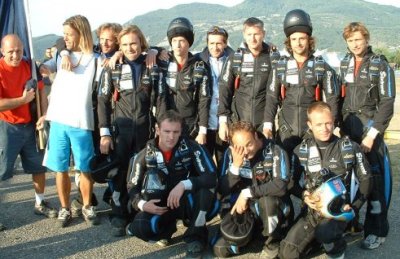 French 8-way lineup of 2003
French 8-way lineup of 2003
It did not turn out much better at the World Meet 2003 in Gap where the French 4-way won the gold medals easily by 15 points. The French 8-way team lost the meet early after two bad jumps on Round 2 and Round 7 and ended up in 3rd place behind Russia and USA.
The 4-way victory was the 4th gold medal for Jerome David. It was still hard for him to appreciate it since he had put so much of his time and efforts into the 8-way project. The success in 4-way was not enough for him. He remembered that the 8-way team was ready to win but missed its opportunity in Gap. It would take more efforts and more years to continue the pursuit of the ultimate challenge. It became even more challenging for the national coach when the French federation decided to strongly support the female 4-way event, as well. Now he had to recruit an additional lineup that could win gold medals for France, while it would make the budget situation more difficult.
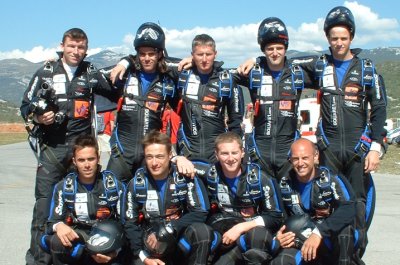 French 8-way lineup of 2004
French 8-way lineup of 2004
2004 was a special year for the sport when the next World Championship of Formation Skydiving was scheduled in Croatia just ten months after the last one in Gap, France. It would have been possible for Jerome David to try the double gold challenge once again. However, both teams were tired, especially the 4-way members who had put so much energy into both events. Jerome David decided that the next national teams would focus only on one event and began to build two new groups: a new French 8-way team and also a new French female lineup.
He chose to give the young lineup an opportunity in 8-way that he had selected as the "farm team" in 2000. Manu Sarrazin, who was already in the 2002/2003 lineup, became the team captain. Erwan Pouliquen, who was still competing in 4-way, was assigned as the external 8-way coach. The new 8-way team was not ready to win in 2004, but Jerome David felt that this new generation of French FS competitors would be able to win the 8-way sword for France. He knew that France had never won 8-way gold in the history of Formation Skydiving competition. It was time for Jerome David to take on this historical challenge for France.
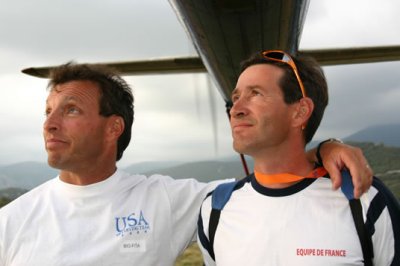 Friends and competitors: Dan BC and Jerome David
Friends and competitors: Dan BC and Jerome David
The eternal competition between Jerome David and Dan BC turned out to be in US favor in Croatia 2004. Synchronicity won by three points over the new French team. However, Jerome David was aiming at the World Meet 2006 in Germany with his young team. The situation was the same for the female lineup and the 8-way team. Both were in Croatia to learn for the future. The young French 8-way lineup learned quickly too and finished in 2nd place behind Airspeed. They had performed stronger than expected and were even in contention for the 1st place. The final round would have been the final opportunity, but rain in the morning of the last meet day stopped the competition.
Jerome David was not very happy with the results of the 4-way Open Class competition in Croatia. The story of a bad video angle in Round 5 and the following defeat against DeLand Majik became a poor happy end for this lineup, which the French national coach wanted to forget quickly. The US delegation won all three gold medals, and France went home with three silver medals.
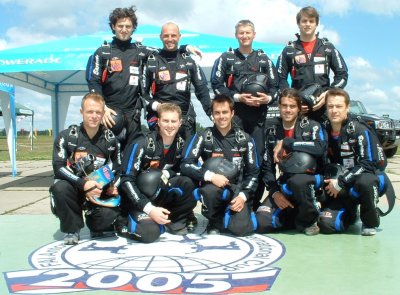 8-way success at the Malevsky Cup 2005
8-way success at the Malevsky Cup 2005
Jerome David and the French federation were still happy with the results in Croatia. The French national coach continued with exactly the same 8-way lineup (Manu Sarrazin, Bruno Perin, Damien Sorlin, Clement Martin St Leon, Mathieu Bernier, Guillaume Bernier, Julien Degen and Jeremie Rollett) and the female 4-way team of 2004 (Sophie Deremaux, Sandy Labattu, Severine Bocquet and Cathy Gallet). He was hoping to win both sets of gold medals in Germany 2006 after two more years with the same lineups.
The new 2-year period with the young groups would be financially difficult for the French FS budget. Jerome David had to become creative and announced a new qualification system for the 4-way Open Class event. The winner of the French Nationals 2006 would become the French national team for the World Meet 2006 Gera, similar to the US qualification system. Jerome David thought that this unusual idea in France might allow the lineup of 2000 - 2004 a possibility to be in contention without too much financial input.
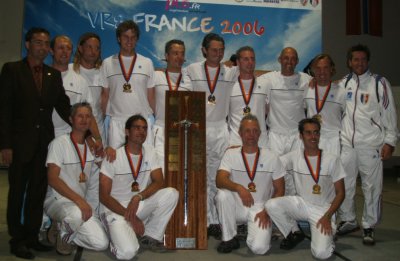 First French 8-way gold medals in 2006
First French 8-way gold medals in 2006
In Gera 2006, he once again met Dan BC on the other side of the female 4-way competition who was now coaching the British team Airkix. The result was the same, and France went home with silver medals in this category. Jerome David still considers this 2nd place the worst failure in his whole coaching career: "Having worked more than four years with a team without reaching the gold medal position is a very painful experience."
He had enjoyed the work with this lineup and hoped so much that he could help them get to the very top. It did not work out, however, the first French 8-way gold medals in Gera 2006 helped him to digest what he remembers as the "female fiasco". The young 8-way lineup was performing very strongly in the bad German weather conditions. Jerome David remembered that his 8-way team had perfect jumps in Round 3 and Round 4, which created enough distance to Arizona Airspeed.
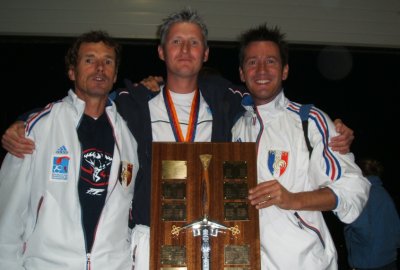 Jerome David with the 8-way sword in 2006
Jerome David with the 8-way sword in 2006
Last not least, Jerome David also added 4-way Open Class silver medals to his collection. The "pickup team" of 4-way and 8-way veterans won the second place in Germany without any significant training over Itali's team Sinapsi and Russia's Sky Panthers. France won one set of gold and two sets of silver medals and the Patrick de Gayardon award for the best nation in Formation Skydiving. It was the first time for France in 2006.
Now there was only one big goal left for Jerome David, and he was ready to pursue his vision. He wanted to guide this exceptional generation of young French competitors, who he had worked with since 2000, to the ultimate goal. He started to work on his final mission.
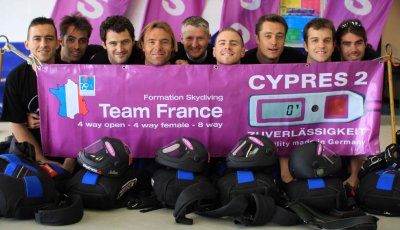 New 8-way lineup for 2008
New 8-way lineup for 2008
Jerome David had gathered his national teams at the end of the 2006 season to determine the goals for the next four years. The strategic plan was plain and simple: go for three sets of gold medals in 2010.
The French national coach had checked all the cycles of previous years and concluded that 2-year plans were usually not efficient enough to pursue big challenges. He decided to organise all his teams and the options for training looking at the best approach for 2010 instead.
However, he had to deal with an unpredictable situation. The new 8-way world champion lineup of 2006 was ready to disband. Six of the 8-way members wanted to compete in 4-way where France had not had an official national 4-way team since 2005.
It was obviously difficult to choose four members of six world champions without harming the group dynamics. He had to find a French 4-way mix that will work hard to win gold medals without causing trouble for the 8-way lineup that he had built up since 2004. He also had to recruit a completely new female 4-way lineup, which would require additional money and energy.
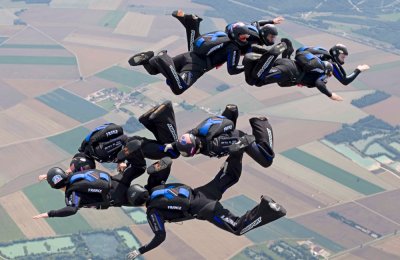 French 8-way lineup of 2008 in action
French 8-way lineup of 2008 in action
He selected Mathieu Bernier, Guillaume Bernier, Julien Degen and Jeremie Rollett for the new French 4-way Open Class lineup and had one condition. The new team would first have to focus on the 8-way event for two years to guarantee the one needed gold medal for France in Maubeuge 2008. This way, Jerome David would also have enough time to prepare a new generation of 8-way competitors for the World Meet 2010. The new 4-way team would then have the possibility to focus only on 4-way after 2008, and France might have the best chances to reach Jerome David's final goal in 2010.
Result of these politics at the end of the 2006 season was the fact that Jerome David had an 8-way lineup in Maubeuge 2008 with only one change compared to the 2006 lineup. Erwan Pouliquen filled the slot for Damien Sorlin who took a break for professional reasons. Erwan Pouliquen was now technical coach and competitor in 8-way at the same time.
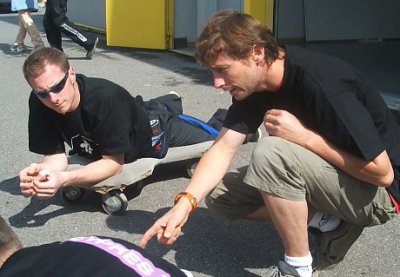 4-way coach Marin Ferre
4-way coach Marin Ferre
Two years later, the French audience in Maubeuge sang the Marceillaise during the 8-way award ceremony, which left a lasting impression for Jerome David: "This small drop zone that had supported the different French Formation Skydiving teams since 1996 was able to organise a very professional competition with a great atmosphere and strong media coverage."
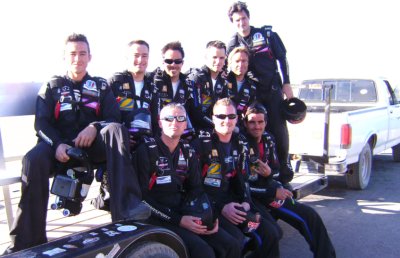 French 8-way vacation at the USPA Nationals 2008
French 8-way vacation at the USPA Nationals 2008
Only six rounds were completed, just like two years ago in Germany. However, France had the 8-way gold medals, and the French 4-way Open Class team missed the 1st place only by a single point to Arizona Airspeed. The female 4-way lineup finished in 3rd place. It was actually an acceptable result for the "transitional event".
Jerome David thought that his golden 8-way lineup, the foundation of his 4-year plan, deserved a celebration of the hard work and achievements, and he sent the whole team to compete at the USPA Nationals 2008 in Eloy. The French 8-way team appreciated the extra vacation team and finished its commitment with an impressive meet average above 22 points after ten rounds.
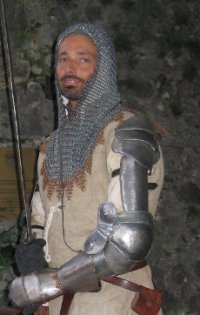 Martial Ferre ready for a new battle
Martial Ferre ready for a new battle
He was prepared for the 8-way situation and the last 2-year period of his 4-year plan. He had in mind a three-layered solution for a couple of months. He had asked Martial Ferre, Marin Ferre’s brother, to come back for just one more last year. Martial Ferre was a 4-way world champion with Jerome David in 1999, and he was also on the French 8-way team that placed 2nd at the World Meet 2003 in France. He had stopped competing to focus on his work and family, even though he still had this bad feeling of "unfinished business" inside.
Jerome David knew that and invited him to come back and take a key slot for a very important mission. Martial Ferre was now the oldest team member, together with Erwan Pouliquen, both coming from the French generation of the 90s. They were Jerome David's first layer of players for the new 8-way project.
The second layer were the recent 8-way world champions (Clement Martin St Leon, Damien Sorlin, Manu Sarrazin) who were a solid group of up-to-date competitors. Finally, he would add three young competitors who he had prepared in the national B-Team lineups since 2007. Julien Olek, Thomas Perrin Gachadoat and Arnaud Mille were selected from a group of ten candidates.
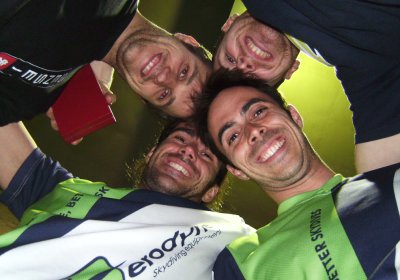 Psychology in Bedford: after first victory over Airspeed
Psychology in Bedford: after first victory over Airspeed
The first step of the final two years was promising. The French delegation won the three sets of gold medals at the World Cup 2009 in Prostejov, Czech Republic. Both 4-ways teams were beginning to show their strength and consistency. The 8-way team was learning how to fly like the previous lineup, jump by jump. Both 4-ways attended two more strategic events after Prostejov to prepare themselves and learn to produce their best performances in every competition jump. They competed in Dubai and at the FSL Shamrock Showdown 2010.
A major psychological step for the 4-way Open Class team was the 1st place at the World Challenge 2010 in April. Mathieu Bernier, Guillaume Bernier, Julien Degen and Jeremie Rollett defeated Arizona Airspeed in Bedford, and Jerome David knew from his own experiences how important this was. His own first World Meet victory over Airspeed in 1999 was preceded by winning the Valentine's Meet on Airspeed's home turf in Eloy.
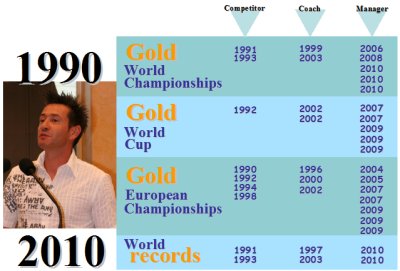 Successful career as competitor and coach: Jerome David
Successful career as competitor and coach: Jerome David
The Final Showdown in Menzelinsk
"First, the 4-way female team opened the road. The girls did an incredible performance and won the gold medals for the 1st time in the French history. Moreover, they realized a female world record with a 47-point jump and finished with a 23.6 average, twenty points ahead of the UK team.
On the 8-way side, after a very bad second day with some performances heading downwards, the new three-layer team finally won by seven points ahead of the Golden Knights to bring back home the 8-way sword for the third consecutive time.
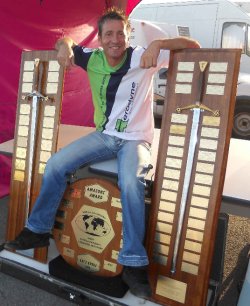 Mission accomplished - Dream come true
Mission accomplished - Dream come true
Both teams had fought and peaked for three complete days, in order to be the masters of those world championships, Airspeed after four years of domination, the French team with the new world record of Round 3 (56-pointer) and all confidence. Both teams were tied going into this last round. Mathieu Bernier, who was already a new 8-way world champion, would have to focus one more time - the 20th time in Menzelinsk. Airspeed scored a wonderful 23-pointer in the last sequence, and the whole dropzone crowd was in front of the big screen for the final judgment.
Then the French squad came on the screen to be judged. Everybody witnessed an incredible performance, a kind of a jump that you can just dream of. 26 points! Then the atmosphere became frenzy. The 4-way sword would go back to France, and the first double gold in the history of the sport was here in the hands of Mathieu Bernier. August 4th brought four gold medals for France in all four FS events, and the ultimate accomplishment was here in Menzelinsk!"
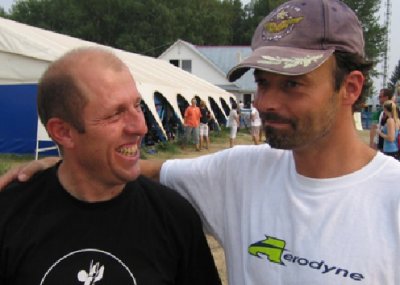 Friends on the road: godfather Toshiba and Martial Ferre
Friends on the road: godfather Toshiba and Martial Ferre
Jerome David has accomplished his triple gold mission that he had always dreamt about. He will now be able to stop and be in peace after this long quest. He feels that he will be quiet for the rest of his life. He will have time to remember those 21 years with the French national teams while dining peacefully with Fred Leroux Toshiba, his packer for more than 16 years, who is also the godfather of his daughter. He says that he will now enjoy with serenity the long winter nights with all his friends from the many different teams, recalling together with them all the big events, the big victories as well as the defeats, the good times and the bad times that he has shared with all of them for so many years.
He has reached the end of this road, and he knows for sure now that the treasure was not winning the gold - it was the road itself that he shared with team mates and friends.